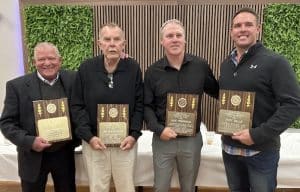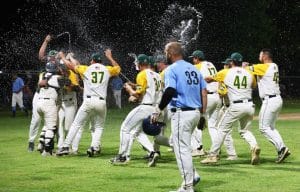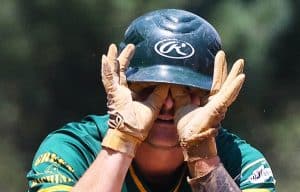Local coaching legends discuss evolution of sports
A panel of legendary local coaching figures discussed changes that have occurred in sports over the years during a program presented Thursday at the Waterloo VFW as part of the ongoing Smithsonian “Hometown Teams” sports exhibit.
“Hometown Teams” remains on display through Sept. 7 at the Monroe County History Museum in Waterloo along with local companion piece “From Fields to Dreams.” Visit www.monreocountyhistorymuseum.com for more information.
Thursday’s program, titled “Back to the Future,” featured a venerable who’s who of Monroe County coaching legends: retired state-winning Gibault soccer coach Jim Corsi, former Waterloo High School basketball and tennis coach Larry Henson, longtime softball and baseball coach Rich Fisher, former WHS football coach Tom Vogt, and long-standing Mon-Clair League managers Vern Moehrs and Dennis “Boog” Pieper.
The panel discussion was moderated by retired teacher and sportswriter Art Voellinger, who serves as a historian for the Mon-Clair League and has authored multiple books on baseball. Voellinger first asked the distinguished panel to pick one change they have noticed in the sport of their choosing. Corsi, who won three state soccer titles as coach of the Hawks, brought up the development of youth soccer leagues in America as one major change over the years.
“It’s really grown,” Corsi said. Later in the program, Corsi said he expects “massive growth” in the game of soccer in America going forward. As for the emergence of youth soccer academies, Corsi said young soccer athletes are having to pay to play. Some of these academies carry 30 to 40 members on a team, with the top 15 or so main players paying the same as those on the roster who sit on the sidelines. “That’s gotta change,” he said.
The topic of football — from the struggle to start a program at WHS in the 1970s and 1980s to today — was touched on by Vogt and Henson.
“It was tough,” said Henson, who served as WHS athletic director around that time. “It took 10 years and four (school board) votes to start it up.”
Henson also remembered some of the first teams in the early 80s and the challenge of introducing the sport to local youth.
“They didn’t know how to put on their equipment,” Henson said. “They didn’t know anything.”
Henson credited Vogt for getting the WHS football program to where it is today. “He’s responsible for keeping football going,” Henson said.
Vogt said that WHS football had a hard time at the start due to a lack of funding and experience. He praised the community for really coming together to support the sport — namely parents and volunteers.
“The parents played a big role. The things these volunteers have done over the years, carried us for many years and still do,” Vogt said.
The growth of a youth football league in Waterloo in recent years has helped immensely with the development of the WHS football program, Vogt added.
“Little league football has come a long way,” Voellinger said in agreement.
There was plenty of baseball discussed as well, a given considering all the time invested in the sport among Moehrs, Pieper and Fisher.
“Baseball’s been very good to me,” said Moehrs, who has 1,895 wins as coach of the Waterloo Buds-Millers.
Moehrs said he thinks parents are wearing their children out by paying for them to play in so many select leagues all Pictured, former Mon-Clair League baseball player Paul Braun of Smithton holds the commemorative bat he won as an attendance prize, which was autographed by panel members.
“It’s becoming a job for them,” Moehrs said. “They should have fun.”
Pieper suggested that young boys “focus on the mechanics” of pitching rather than trying to throw every day, thereby risking injury or muscle fatigue.
When asked by audience member Dennis Schreder if all the money spent for children to play in select leagues throughout the year was making them better players, Pieper said it probably helps a little bit.
“I think you can burn them out,” Pieper said. “But when you’re an athlete, you’re an athlete.”
On the topic of instant replay being introduced in baseball and technology in general taking on a stronger role, most everyone was in agreement that it takes away from the human element of America’s pastime.
“Baseball is a very controversial game,” Moehrs said.
“You know, the great thing about baseball is the mistakes. Good or bad, you still need umpires.”
Audience member Lon Fulte, a WHS baseball coaching legend, agreed.
“I miss the good ol’ Earl Weaver arguments,” he said.
There will be more conversations on the game of baseball this Thursday night, as the “Hometown Teams” program “Chalk Lines, Blood Lines: Talkin’ Baseball” will take place starting at 7 p.m. at Turner Hall in Columbia. Admission is free.
Panel members slated to appear are Bob Blank, Dave Dillenberger, Fulte, Nellie Mathews, TJ Mathews, Lucille Moehrs, Dottie Pieper, and Brad and Bud Rippelmeyer.






